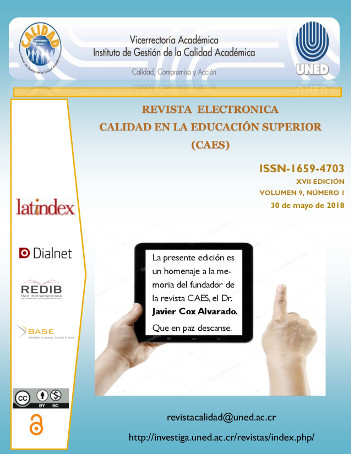Curriculum design based on competencies for the open and distance systems: creation of a Master’s degree in Food Security
DOI:
https://doi.org/10.22458/caes.v9i1.2072Abstract
Ensuring food security is a global problem, so the need arose to create an educational program that will contribute to the generation and management of knowledge on food security from a panoptic and international vision, able to become actual intervention projects and collaborative and transdisciplinary global cooperation projects promoting the involvement of intersectoral levels, governmental or private and, above all, generating collaborative projects. Therefore, from the action research process, a proposal based on the Open and Distance University, systems was developed for a curriculum design under the socio-formative competence approach for a master’s degree program in food security, using as data sources an extensive literature review, other relevant documents, open interviews, an anecdotal record and the discussion group technique. It is expected that implementing this curriculum design will result in training professionals capable of generating actions to alleviate hunger and promote rural development.
References
Elliot, J. (2000). La investigación – acción en Educación. (4°ed.). Madrid: Morata.
Elliott, J. (1986). “Action-research": Normas para la autoevaluación en los colegios, en L. Haynes, Investigación-acción en el aula (21-48). Valencia. Generalitat Valenciana, Conselleria de Cultura, Educación i Ciència.
Gutiérrez, R. (1996). Introducción al conocimiento científico. (10ª ed.). México. Esfinge.
Hernández, R., Fernández, C. y Baptista. L.P. (2006). Metodología de la investigación. (4°ed). México: Mc Graw Hill.
Kemmis, S. y McTaggart, R. (1988). Cómo planificar la investigación-acción. Barcelona. Alertes.
Oja, S. N. y Smulyan, L. (1989). Collaborative action research: A developmental approach. London: The Falmer Press.
Ramas, E. (2008). Un modelo de educación a distancia basado en el desarrollo de competencias tecnológicas para la formación docente. (Tesis de Maestría en Pedagogía. UNAM).
Rodríguez G., Gil F. y García J. (1999). Metodología de la investigación cualitativa. España: Aljibe.
Rojas, R. (2002). Guía para realizar investigaciones sociales. (34ª ed). México: Plaza y Valdés.
Downloads
Published
How to Cite
Issue
Section
License
Esta revista provee acceso libre inmediato a su contenido bajo el principio de que hacer disponible gratuitamente la investigación al publico, lo cual fomenta un mayor intercambio de conocimiento global.
